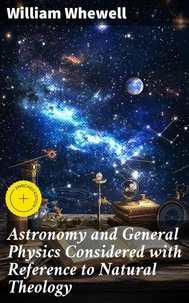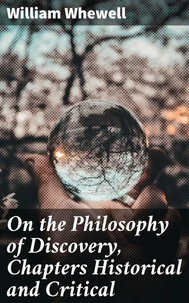Novum organon renovatum. Being the second part of the philosophy of the inductive sciences
Par :Formats :
Disponible dans votre compte client Decitre ou Furet du Nord dès validation de votre commande. Le format ePub est :
- Compatible avec une lecture sur My Vivlio (smartphone, tablette, ordinateur)
- Compatible avec une lecture sur liseuses Vivlio
- Pour les liseuses autres que Vivlio, vous devez utiliser le logiciel Adobe Digital Edition. Non compatible avec la lecture sur les liseuses Kindle, Remarkable et Sony
 , qui est-ce ?
, qui est-ce ?Notre partenaire de plateforme de lecture numérique où vous retrouverez l'ensemble de vos ebooks gratuitement
Pour en savoir plus sur nos ebooks, consultez notre aide en ligne ici
- Nombre de pages320
- FormatePub
- ISBN406-633--953111-6
- EAN4066339531116
- Date de parution10/07/2023
- Protection num.Digital Watermarking
- Taille684 Ko
- Infos supplémentairesepub
- ÉditeurGOOD PRESS
Résumé
In "Novum Organon Renovatum, " William Whewell undertakes a profound analysis of the methodologies and epistemologies underpinning scientific inquiry. As a masterful synthesis of philosophy and science, the text builds on the foundations laid by Francis Bacon, advocating for a systematic approach to the empirical investigation of nature. Whewell employs a rigorous literary style, characterized by meticulous argumentation and a clear, coherent structure, which reflects his commitment to clarity in philosophical discourse.
The work resonates within the broader context of 19th-century scientific thought, a period marked by significant advancements in the natural sciences, and it serves as a clarion call for a reflective understanding of scientific practice. Whewell, known for his illustrious career as a philosopher, historian of science, and mathematician, was deeply engaged with the intellectual currents of his time, which informed his perspectives on the scientific method.
His experience as a scholar at Trinity College, Cambridge, combined with a versatile understanding of various scientific disciplines, shaped Whewell's conviction that philosophy must substantively interact with the sciences. This rich background allows him to elevate his discourse, bridging the gap between abstract thought and practical application. Readers interested in the philosophy of science will find "Novum Organon Renovatum" to be an enlightening exploration that not only critiques existing methodologies but also offers a revitalized framework for understanding scientific progress.
Whewell'Äôs insightful reflections encourage a deeper appreciation of the interplay between theory and practice, making this text an essential addition to the library of anyone engaged in the liberal arts or scientific endeavors.
The work resonates within the broader context of 19th-century scientific thought, a period marked by significant advancements in the natural sciences, and it serves as a clarion call for a reflective understanding of scientific practice. Whewell, known for his illustrious career as a philosopher, historian of science, and mathematician, was deeply engaged with the intellectual currents of his time, which informed his perspectives on the scientific method.
His experience as a scholar at Trinity College, Cambridge, combined with a versatile understanding of various scientific disciplines, shaped Whewell's conviction that philosophy must substantively interact with the sciences. This rich background allows him to elevate his discourse, bridging the gap between abstract thought and practical application. Readers interested in the philosophy of science will find "Novum Organon Renovatum" to be an enlightening exploration that not only critiques existing methodologies but also offers a revitalized framework for understanding scientific progress.
Whewell'Äôs insightful reflections encourage a deeper appreciation of the interplay between theory and practice, making this text an essential addition to the library of anyone engaged in the liberal arts or scientific endeavors.
In "Novum Organon Renovatum, " William Whewell undertakes a profound analysis of the methodologies and epistemologies underpinning scientific inquiry. As a masterful synthesis of philosophy and science, the text builds on the foundations laid by Francis Bacon, advocating for a systematic approach to the empirical investigation of nature. Whewell employs a rigorous literary style, characterized by meticulous argumentation and a clear, coherent structure, which reflects his commitment to clarity in philosophical discourse.
The work resonates within the broader context of 19th-century scientific thought, a period marked by significant advancements in the natural sciences, and it serves as a clarion call for a reflective understanding of scientific practice. Whewell, known for his illustrious career as a philosopher, historian of science, and mathematician, was deeply engaged with the intellectual currents of his time, which informed his perspectives on the scientific method.
His experience as a scholar at Trinity College, Cambridge, combined with a versatile understanding of various scientific disciplines, shaped Whewell's conviction that philosophy must substantively interact with the sciences. This rich background allows him to elevate his discourse, bridging the gap between abstract thought and practical application. Readers interested in the philosophy of science will find "Novum Organon Renovatum" to be an enlightening exploration that not only critiques existing methodologies but also offers a revitalized framework for understanding scientific progress.
Whewell'Äôs insightful reflections encourage a deeper appreciation of the interplay between theory and practice, making this text an essential addition to the library of anyone engaged in the liberal arts or scientific endeavors.
The work resonates within the broader context of 19th-century scientific thought, a period marked by significant advancements in the natural sciences, and it serves as a clarion call for a reflective understanding of scientific practice. Whewell, known for his illustrious career as a philosopher, historian of science, and mathematician, was deeply engaged with the intellectual currents of his time, which informed his perspectives on the scientific method.
His experience as a scholar at Trinity College, Cambridge, combined with a versatile understanding of various scientific disciplines, shaped Whewell's conviction that philosophy must substantively interact with the sciences. This rich background allows him to elevate his discourse, bridging the gap between abstract thought and practical application. Readers interested in the philosophy of science will find "Novum Organon Renovatum" to be an enlightening exploration that not only critiques existing methodologies but also offers a revitalized framework for understanding scientific progress.
Whewell'Äôs insightful reflections encourage a deeper appreciation of the interplay between theory and practice, making this text an essential addition to the library of anyone engaged in the liberal arts or scientific endeavors.




